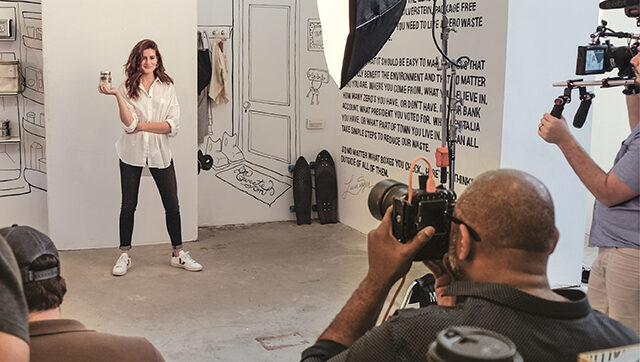Lauren Singer’s interest in environmental sustainability began when, as a teenager, she read Rachel Carson’s Silent Spring, the classic book that documents the devastating effects of pesticides on ecosystems.
“The book opened my eyes to how powerful — either positively or negatively — human actions can be on the rest of the planet,” Singer says.
She took Carson’s lessons with her to New York University, where she majored in environmental studies. But she was frustrated to discover how many of those insights were lost on her fellow students.
One of them, for example, always brought her lunch in plastic clamshell containers, ate with plastic utensils, drank from plastic water bottles, and threw everything away when she was done.
“Here we were, studying how to make the world a better place, and there she was, throwing all this stuff into the garbage,” Singer recalls.
Several days later, however, she noticed that everything in her own refrigerator was covered in plastic. “I was so mad at this girl for making so much plastic trash, and it turned out I was doing the same thing.”
“Living a zero-waste life doesn’t have to cost anything. Saying no is free.”
That epiphany led the budding eco-activist and entrepreneur, now 26, to wean herself from plastic. Since the substance is ubiquitous in our culture — it’s in food containers, toothbrushes, even clothing — Singer realized “the only way I was going to be able to move away from plastic was to learn to make products myself.”
Researching recipes for home-made deodor-ant and face wash led Singer to Bea Johnson’s website, www.zerowastehome.com. A blogger, mother of two, and author of Zero Waste Home, Johnson and her family have lived a waste-free lifestyle since 2008, following what she’s termed the “5Rs”: refuse, reduce, reuse, recycle, and rot.
“I thought I was doing the best thing for the planet by not using any plastic, but the idea that I didn’t have to produce any trash was empowering and inspiring,” Singer notes. “I realized that while I studied, talked about, and protested for sustainability, there was a disconnect between my values and how I lived my day-to-day life.”
Spreading the Word
Singer began adopting Johnson’s 5Rs and transitioning to a zero-waste lifestyle —composting, recycling minimally (it still uses tremendous amounts of energy), and refusing to send anything to a landfill — mainly by avoiding packaged foods. She started bringing her own jars to the grocery store and filling them from the bulk-section bins. She also began buying her vegetables and fruits from the “package-free” farmers’ market, all of which offered some unintended benefits.
“By eliminating foods wrapped in packaging, I found that most of what I had been eating were food products and not actual food,” she says. “Eating fresh vegetables and fruits has left me feeling much healthier — mentally and physically.”
Her sustainable-living focus gradually grew into a broader eco-friendly lifestyle that others began to notice. “I didn’t really talk about the changes I was making when I started,” she says. “Over time, people would ask me questions when I’d bring my Mason jar to the coffee shop, for example, and I realized there was interest in the information.”
These conversations led Singer to launch a blog, Trash Is for Tossers, which offers DIY product recipes as well as a plethora of tips for those looking to minimize their waste. She’s also not shy about debunking various myths about a zero-waste lifestyle, including the notion that it’s an expensive proposition.
“I save a lot of money by refusing to buy new things or by purchasing second-hand clothing,” she notes. “Living a zero-waste life doesn’t have to cost anything. Saying no is free.”
Singer encourages those looking to reduce their eco-footprint to begin by examining their own trash and finding multiuse solutions. Start simply by replacing plastic water bottles with a reusable one or by using canvas totes to carry groceries instead of the paper or plastic bags offered at stores.
And consider learning to make your own personal-care products. “DIY recipes give you full control over what you are putting on your body — and save you money,” she says.
Selling a Philosophy
Knowing that the path to zero-waste can seem daunting, Singer started selling laundry detergent through The Simply Co. to help people who don’t necessarily want to make their own products minimize their chemical exposure and reduce the amount of packaging in their homes.
Her latest coventure with no-waste fashion designer Daniel Silverstein — the Package Free Shop in Brooklyn, N.Y. — provides even more options for people hoping to minimize their contribution to the waste stream.
The one-stop pop-up shop sells all the tools necessary to facilitate a low-waste lifestyle, like multiuse coffee cups, refillable dental-floss containers, even reusable toilet paper. Singer and Silverstein also offer classes on soap making, cooking, and sewing to help customers build the skills necessary to live a zero-waste lifestyle.
To combat the intrinsic waste embedded in the retail and production processes, the store stocks products from brands with strong waste-reduction philosophies. Customers receive shipped items in postconsumer recyclable and compostable packaging materials, secured with paper tape.
While Singer wants the store to be a success, her bottom line extends beyond profit or loss. It operates on the same philosophy that drove her to adopt a no-waste lifestyle in the first place: Every single action you take — intentional or unintentional — is part of a much bigger system.
“I encourage everyone,” she says, “to consider whether what they do or what they buy makes them feel good about themselves and is in service of their values.”




This Post Has 0 Comments